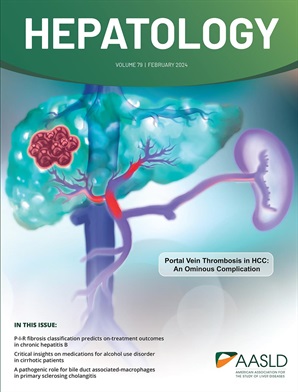不断发展的精确度:胆管癌靶向治疗的最新进展
IF 15.8
1区 医学
Q1 GASTROENTEROLOGY & HEPATOLOGY
引用次数: 0
摘要
下一代测序(NGS)技术用于扩展基因组图谱的发展,已经在大约一半的胆道癌(BTC)患者中发现了可操作的分子改变,其中肝内胆管癌的发病率最高。靶向药物已被证明具有临床益处,同时保持可管理的安全性。因此,尽管缺乏与标准二线化疗的正面比较,但它们现在被推荐用于进展到一线姑息性全身抗癌治疗后仍然健康的晚期疾病患者。在这篇综述中,我们将在临床实践的框架内结合临床试验中观察到的靶向药物的结果。我们将概述在缺乏NGS的情况下应该考虑的可用单基因分析,定义测试优先级,产量差异和治疗意义。最后,我们将讨论BTC精准医疗领域的未来前景,重点关注克服治疗耐药性的新策略,治疗算法中靶向药物的最佳搭配,以及新发现的可操作改变,目前正在研究的化合物。本文章由计算机程序翻译,如有差异,请以英文原文为准。
Evolving Precision: Updates in Targeted Therapy for Cholangiocarcinoma
The development of Next Generation Sequencing (NGS) techniques for extended genomic profiling has led to the identification of actionable molecular alterations in approximately half of the patients with biliary tract cancer (BTC), with the highest incidences among those with intrahepatic cholangiocarcinoma. Targeted drugs have demonstrated to confer clinical benefit while maintaining a manageable safety profile. As a result, despite the lack of a head-to-head comparison with standard second line chemotherapy, they are now recommended for patients with advanced disease who are still fit after progression to first line palliative systemic anti-cancer treatment. In this review, we will contextualize the results observed with targeted drugs in clinical trials within the framework of clinical practice. We will provide an overview of available single-gene analyses that should be considered in case of lack of access to NGS, defining testing priorities, differences in yields, and therapeutic implications. Lastly, we will discuss future perspectives in the field of precision medicine for BTC, focusing on new strategies to overcome treatment resistance, on the optimal collocation of targeted drugs in the treatment algorithm, and on newly identified actionable alterations for which compounds are currently under investigation.
求助全文
通过发布文献求助,成功后即可免费获取论文全文。
去求助
来源期刊

Hepatology
医学-胃肠肝病学
CiteScore
27.50
自引率
3.70%
发文量
609
审稿时长
1 months
期刊介绍:
HEPATOLOGY is recognized as the leading publication in the field of liver disease. It features original, peer-reviewed articles covering various aspects of liver structure, function, and disease. The journal's distinguished Editorial Board carefully selects the best articles each month, focusing on topics including immunology, chronic hepatitis, viral hepatitis, cirrhosis, genetic and metabolic liver diseases, liver cancer, and drug metabolism.
 求助内容:
求助内容: 应助结果提醒方式:
应助结果提醒方式:


